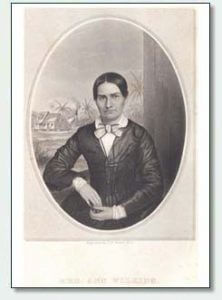
Ann Wilkins, who served as a missionary to Liberia from 1837-1857, was the first American Methodist female missionary sent out by the Missionary Society of the Methodist Episcopal Church.
Prior to Wilkins, other women sent out by the Missionary Socieity had been missionary spouses.
Wilkins founded the first Methodist girls’ school outside of the United States (the Millsburg Female Academy). She was one of the longest-serving missionaries of the first generation of American Methodist foreign missionaries, avoiding the malaria and other health complications that doomed many of her peers. Historian Dana Robert has referred to Ann Wilkins as “The most outstanding of the early overseas missionaries.”
Wilkins was born in the Hudson Valley of New York in 1806. She experienced conversion at age 14. At age 17, she married Henry F. Wilkins, who later abandoned her. As an adult, Ann Wilkins moved to New York City, worked as a teacher there, and attended Bedford Street Methodist Episcopal Church.
Wilkins first offered to go as a teacher to Liberia in 1834, but the Missionary Society took no action on her application at the time.
Then, two years later, she attended a Methodist camp meeting in Sing Sing, NY. John Seys, then serving as the superintendent of the MEC mission in Liberia, preached at the camp meeting. Upon hearing him, Wilkins’ desire to go as a missionary to Liberia was renewed. She sent a note to Nathan Bangs of the Missionary Society declaring, “A sister who has but little money at command, gives that little cheerfully, and is willing to give her life as a female teacher, if she is wanted.” This time, Wilkins’ application was accepted, and she left for Liberia in 1837.
After teaching in the White Plains Manual Labor School and at the Liberia Conference Seminary (now the College of West Africa) during her first year and a half in Liberia, Wilkins founded the Millsburg Female Academy, which would be the focus of her ministry for the remainder of her time in Liberia. In addition to its innovative work in girls’ education, the seminary was notable as one of the first mission institutions dedicated to serving indigenous Liberians and not just Americo-Liberian settlers.
Wilkins’ work in Liberia was sustained by Mary Mason, head of the New York Female Missionary Society, and its members. They supported her through prayer, through fundraising, through sending supplies, by advocating on her behalf to the Missionary Society, and by moral and emotional support.
Wilkins returned twice to the United States for health issues, once in 1841 and once in 1853. Both times she recovered and returned to Liberia. She returned to New York a final time in 1857, again for health reasons. Seven months later, she died and was considered a hero to the early Methodist mission-minded community.
Sources consulted:
“Ann Wilkins (1806-1857),” Portraits of American Women in Religion, The Library Company of Philadelphia, http://librarycompany.org/women/portraits_religion/wilkins.htm, accessed November 19, 2018.
Dana L. Robert, “Called and Sent: United Methodists as Missionaries,” New World Outlook (October 2018), https://www.umcmission.org/find-resources/new-world-outlook-magazine/2018/october/called-and-sent-united-methodists-as-missionaries, accessed November 19, 2018.
Rev. J. P. Durbin, “Mrs. Ann Wilkins,” The Ladies’ Repository 19 no. 11 (Nov. 1859), pp. 641-642, http://quod.lib.umich.edu/m/moajrnl/acg2248.1-19.011/683, accessed November 19, 2018.
Susan E. Warrick, “’She Diligently Followed Every Good Work’: Mary Mason and the New York Female Missionary Society,” Methodist History 34:4 (July 1996): 214-229.




